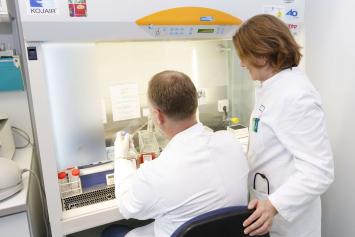
Bad Homburg v.d. Höhe, June 20, 2023 – ForTra gGmbH für Forschungstransfer der Else Kröner-Fresenius-Stiftung (ForTra), a non-profit subsidiary of the foundation EKFS, supports the legally conformant production of new pharmaceutical drug candidates under GMP conditions for direct use in first-in-human clinical studies. ForTra announced three million euros to be awarded in its call for proposals in August 2022. Following extensive scientific review and appraisal, five projects were approved and will be funded as of now.
“The implementation of clinical studies is a cost-intensive and absolutely essential development phase on the path to translating new medications into clinical application,” explains Prof. Dr. Martin Zörnig, the CEO of ForTra. To enable the implementation of a clinical study within individual innovative projects that address a high “medical need”, ForTra is going to financially support the production of clinical trial material under GMP conditions as prescribed by law.
The entire production process or individual parts thereof shall be funded for a variety of active compound classes, for example “small molecules”, peptides, DNA or medicinal cell therapy products. Eligible to submit proposals were research scientists who work at academic research facilities or other non-profit scientific entities. Out of the total of 34 proposals submitted, the following five projects have asserted themselves successfully.
Production of Corallopyronin-A clinical trial samples:
Prof. Dr. Achim Hoerauf, University Hospital Bonn; Prof. Dr. Karl Wagner, University of Bonn; Prof. Dr. Marc Stadler, Helmholtz Center, Brunswick
Corallopyronin A (CorA) is an antibiotic that is obtained biotechnologically from marine seabed bacteria. Its range of efficacy includes tropical diseases and multiresistant bacteria. For CorA to be effective as a capsule requires it to be embedded in edible polymers that improve solubility. Carrying out clinical trials necessitates a certified production, which is going to be made possible by ForTra.
GMP production of a non-viral gene transfer vector for ROR1-specific CAR T cells and immunotherapy for ROR1+ tumors:
Prof. Dr. Michael Hudecek, University Hospital of Würzburg
The goal is the production of special genetic material toward implementation of the ROR1-CAR T cell therapy treatment method. Modifying T cells together with the genetic material enables the T cells to detect the ROR1 protein on the cell surface of tumor cells and kill them. Within the scope of the LION-1 study, patients with various cancerous diseases are intended to be treated by having these modified T cells administered to them.
Nasal application of Staphylococcus lugdunensis toward eradication of Staphylococcus aureus – an initial microbiome interventional study using human beings – LuCa:
Prof. Dr. Andreas Peschel, Dr. Meral Esen, University of Tübingen
To prevent severe infections due to methicillin-resistant Staphylococcus aureus (MRSA) pathogens, a probiotic strain of bacteria has been developed that drives out MRSA from the nose, the natural habitat of MRSA. This “Staphylococcus lugdunensis” is intended to be studied on volunteers in terms of its effectiveness in order to avert long-term harmful infections in the case of high-risk patients.

Production of autologous GMP-conformant T cells which express CSPG4-specific CAR toward the clinical treatment of metastasized uveal melanoma:
Prof. Dr. Niels Schaft, Prof. Dr. Caroline Bosch-Voskens, University Hospital Erlangen
Many patients suffering from cancer are unable to generate T cells that effectively detect tumor cells. The technique of RNA electroporation enables the blueprint (RNA) for suited, cancer-specific receptors to be infiltrated into T cells, which are subsequently able to kill cancer cells. The funding makes it possible to produce T cells for clinical application in patients with uveal melanoma.

Peptide warehouse for the development of personalized immunotherapies toward eliminating residual leukemic stem/progenitor cells in the case of acute myeloid leukemia (AML):
Prof. Dr. Juliane Walz, University of Tübingen and University Hospital Tübingen
Acute myeloid leukemia is the most frequent acute hematological malignancy occurring in adults. Following therapy, leukemic stem cells (LSCs) often remain which lead to a relapse or a recurrence of the disease. In this project a vaccine is now going to be produced and tested in clinical trials that is supposed to align the immune system against these LSCs in a targeted manner. The intention is to distinctly improve the cure rate among patients as a result.
ForTra gGmbH für Forschungstransfer der Else Kröner-Fresenius-Stiftung (ForTra)
ForTra is a non-profit subsidiary of the foundation Else Kröner-Fresenius-Stiftung. The purpose of the German limited liability company is the advancement of medical science and research along with the promotion and support of public health through the translation of medical research findings into clinical application to the benefit of both patients and public healthcare. You can find more information about projects funded by ForTra at: https://www.ekfs.de/en/scientific-funding/funding-lines/translational-research
Scientific Contact:
ForTra
Prof. Dr. Martin Zörnig
CEO ForTra gGmbH für Forschungstransfer der Else Kröner-Fresenius-Stiftung
c/o EKFS
Tel.: +49 6172 8975-12
eMail: m.zoernig@ekfs.de
Else Kröner-Fresenius-Stiftung (EKFS) – Advancing research. Helping people.
Else Kröner-Fresenius-Stiftung is a non-profit foundation dedicated to the funding and advancement of medical research and the support of humanitarian projects. To date the foundation has funded around 2,400 projects. With an annual funding volume currently amounting to over 60 million euros it is the largest foundation in Germany that actively funds and supports medicine. You can find more information at: www.ekfs.de
Press Contact
Else Kröner-Fresenius-Stiftung
Bianka Jerke
Presse- und Öffentlichkeitsarbeit
Tel.: + 49 6172 8975-24
eMail: b.jerke@ekfs.de